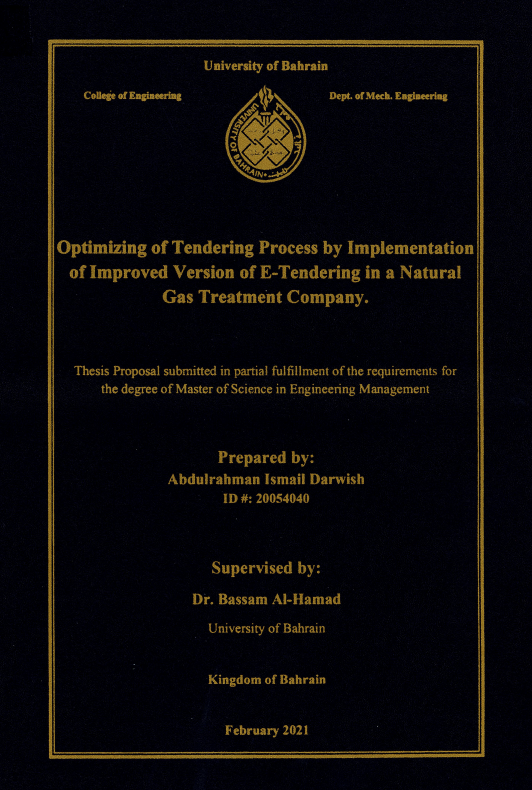Optimizing of Tendering Process by Implementation of Improved Version of E-Tendering in a Natural Gas Treatment Company.
Linked Agent
Al-Hamad, Bassam , Thesis advisor
Language
English
Extent
[1],13,121,[2] pages
Place of institution
Sakhir,Bahrain
Thesis Type
thesis(Masters)
Institution
University of Bahrain, College of Engineering, Dept. of Mech. Engineering
Description
ABSTRACT:
Ever since the world started becoming more and more smaller through the great globalization movements and the advanced technologies of shipping and transport. Organizations started to move toward tendering for any outsourcing of services or material required in order to achieve the best quality with the lowest cost as possible. Of-course as any other method of outsourcing, traditional tendering started to show some dis-advantages through the process due to the reliance on old means of communication and dependency on paper work. Therefore, this research is aimed to investigate the effect of adopting E-tendering instead of the traditional tendering, its advantages, dis-advantages and challenges. Moreover, an improved version of E- tendering will be investigated, where the evaluation of tender bid stage is fully systemized. Such aim for the research is planned to be achieved through multiple research instruments such as: 1- conducting a case study on Banagas to have better idea about its tendering process, 2- conducting in-depth interviews with experienced individuals in the tendering and E-tendering process, 3- conducting questionnaire survey to targeted population to check their opinion and importance ranking of each advantage of E-tendering and dis-advantages of traditional tendering, and lastly 4- design a soft file that simulate the systemized tender bid evaluation stage to check the effectiveness of the improved version of E-tendering. The result and findings of the research concluded that adopting E-tendering would greatly enhance the performance of Banagas tendering process in every aspect, specifically in the aspects where the traditional tendering showed dis-advantages. Moreover, the result showed that the improved version of E-tendering has great enhancement on the tendering process more than the regular E-tendering since it will help in achieving a total of 44.4% reduction in the duration of tendering process rather than the 36.7% reduction achieved by the regular E-tendering.
Ever since the world started becoming more and more smaller through the great globalization movements and the advanced technologies of shipping and transport. Organizations started to move toward tendering for any outsourcing of services or material required in order to achieve the best quality with the lowest cost as possible. Of-course as any other method of outsourcing, traditional tendering started to show some dis-advantages through the process due to the reliance on old means of communication and dependency on paper work. Therefore, this research is aimed to investigate the effect of adopting E-tendering instead of the traditional tendering, its advantages, dis-advantages and challenges. Moreover, an improved version of E- tendering will be investigated, where the evaluation of tender bid stage is fully systemized. Such aim for the research is planned to be achieved through multiple research instruments such as: 1- conducting a case study on Banagas to have better idea about its tendering process, 2- conducting in-depth interviews with experienced individuals in the tendering and E-tendering process, 3- conducting questionnaire survey to targeted population to check their opinion and importance ranking of each advantage of E-tendering and dis-advantages of traditional tendering, and lastly 4- design a soft file that simulate the systemized tender bid evaluation stage to check the effectiveness of the improved version of E-tendering. The result and findings of the research concluded that adopting E-tendering would greatly enhance the performance of Banagas tendering process in every aspect, specifically in the aspects where the traditional tendering showed dis-advantages. Moreover, the result showed that the improved version of E-tendering has great enhancement on the tendering process more than the regular E-tendering since it will help in achieving a total of 44.4% reduction in the duration of tendering process rather than the 36.7% reduction achieved by the regular E-tendering.
Member of
Identifier
https://digitalrepository.uob.edu.bh/id/e17807ea-2cbe-4526-aedd-7913e60d665f
https://digitalrepository.uob.edu.bh/id/e17807ea-2cbe-4526-aedd-7913e60d665f
